Are you experiencing a high TSH but normal T4?
Are you confused about interpreting these values?
Is your Doctor telling you that your tests are normal even though you are experiencing abnormal symptoms?
This article will help shed light on this thyroid lab pattern and help you understand what it means.
You’ll learn more about the symptoms associated with this pattern (and other patterns) and how to treat them below:
Is This Thyroid Lab Testing Pattern Bad?
The first thing you should know is that having a high TSH, even if accompanied by a normal T4, is never a normal sign.
A high TSH is a marker that the connection between your brain and your thyroid may not be functioning at 100%.
What do I mean?
In order to understand this concept, you have to understand how TSH functions in your body.
TSH (also known as thyroid stimulating hormone) is a hormone that is produced by the pituitary gland.
Its job is to act on your thyroid gland (in your neck) to tell your thyroid to produce more thyroid hormone.
If your TSH is elevated this means your brain is trying to increase the “stimulus” to your thyroid gland in an attempt to compensate for decreased thyroid hormone (1).
This process is how your brain and your thyroid gland regulate thyroid hormones in your blood.
As thyroid hormones drop your TSH will rise to compensate to tell your gland to produce more.
This rise in TSH is almost always seen as an early and sensitive marker for thyroid dysfunction!
So, while TSH tells you how responsive your thyroid gland is to thyroid hormone it doesn’t give information on your free thyroid hormone levels.
What your Free Thyroid Hormones Mean for You (Free T3 & Free T4)
Most physicians (Doctors) tend to order what is known as a TSH with reflex to free T4.
This lab test is supposed to only order the free T4 IF the TSH is abnormal (2).
The idea is that it saves on the cost of unnecessary lab tests because why would you need to see the free T4 if the TSH is normal?
So, what ends up happening, is many patients get their thyroid “checked” which results in this TSH with reflex to free T4.
When they find that their TSH is abnormal the lab company will automatically order free T4.
But they might get confused when the free T4 comes back as “normal” or within the normal range.
How can this be if your TSH is high?
Several things may account for this phenomenon.
#1. Your thyroid gland is struggling but still able to keep up… for now.
The rise in your TSH is a normal physiologic response for lower-than-normal free thyroid hormones and it indicates that everything is working properly.
But as TSH rises it means that your thyroid gland is no longer responsive to the lower doses of TSH that it once was.
This usually indicates an early problem with the thyroid gland itself.
Why?
Because your thyroid gland is getting the stimulus from the brain to produce more thyroid hormone (hence the high TSH) but it’s only capable of producing a “normal” amount of T4.
We know this because we know what a HEALTHY TSH level is supposed to be (3).
We also know that a high TSH is not necessary to produce adequate thyroid hormones.
So this early rise in TSH can be used as a sensitive marker for early thyroid GLAND dysfunction.
By the way, you may find that both your free T3 and free T4 stay “normal” despite having a very high TSH.
This is seen as your body is attempting to compensate for the early problems described above but it does NOT mean that this is “normal”.
Eventually, your thyroid will be unable to meet the demand and you will experience severe symptoms (if you aren’t already).
#2. The lab tests may not be accurate.
This one is rare but it certainly does happen.
It is estimated that up to 5% of all lab tests may be inaccurate or spurious.
This is as high as 1 in 20 lab tests and if you get a full panel of lab tests you can count that at least a few of those results are not 100% accurate.
This inaccuracy stems from the fact that lab testing machines must be calibrated to normal each and every day.

If there is something wrong with the machine for one test or the calibration is not done accurately, then some of the lab tests may not be accurate.
So what should you do if you feel that your results are not accurate?
The best thing to do is to simply re-test your TSH and free T4 within 1-2 weeks.
The chances of your lab tests being inaccurate are very low, but it’s worth going through this song and dance if you don’t have any symptoms and feel great.
#3. You may have Hashimoto’s Thyroiditis.
Another possibility is that you have an autoimmune disease known as Hashimoto’s thyroiditis.
It is well known that this thyroid condition can cause changes to thyroid lab tests which are not considered to be “normal” (4).
In fact, many patients with Hashimoto’s are not treated sufficiently because their symptoms do not always correlate with their lab results.
When in doubt, make sure that you always look at your body and your symptoms and don’t focus solely on your lab tests.
If you suspect that you may have Hashimoto’s you can easily check for this condition with a blood test which checks for thyroid antibodies.
#4. You may not be converting T4 to T3.
Lastly, it’s possible that you may not be seeing the “whole picture” when it comes to your thyroid.
While your TSH and free T4 are important measures of thyroid function they do not test every facet of thyroid function in your body.
Free T3 is the ACTIVE thyroid hormone and it is created through a process known as thyroid conversion.
In this process, your body takes free T4 and turns it into free T3.
So, why does free T3 matter?
Consider this scenario:
Imagine that your TSH is high and your free T4 is normal but you decide to check your free T3 as well.
You may find that your free T3 is actually quite low which indicates that your body can produce some amount of T4 but it’s not able to convert that T4 into T3.
This is known as a problem with thyroid conversion and can be entirely missed unless you also check for your free T3.
For this reason, I always recommend that you look at a complete thyroid panel (if you suspect you have thyroid disease).
If you didn’t get a full thyroid panel to start with you can always go back and get everything retested.
Symptoms Associated with a High TSH
Will you have symptoms if you have a high TSH and a normal T4?
You might expect that you would be without symptoms if your free thyroid level is “normal” but that isn’t always the case.
In fact, most patients with a high TSH (regardless of their free thyroid hormone levels) may be symptomatic.
A handful of patients may be asymptomatic (meaning they won’t experience symptoms) most likely due to their body having a “reserve” level which can keep them going for some time.
But, if you are like most people, you may start to experience certain symptoms.
In fact, these symptoms may be the reason you went to your Doctor in the first place and had your blood work checked.
The symptoms associated with a high TSH are easy to identify because they are the symptoms of low thyroid function or hypothyroidism.
Symptoms of a high TSH and normal T4 include:
- Mild weight gain (usually no more than 2-5 pounds)
- Cold intolerance or feeling like you are cold all the time
- Mild constipation
- Dry skin
- Feeling “down” or “depressed”
- Mild brain fog or clouded thinking/judgment
The degree of symptoms that you will experience will depend on the degree of elevation of your TSH (5).
Put simply:
The higher your TSH, the more your thyroid gland is compromised and the more severe your symptoms will be.
So, you may experience only mild weight gain if your TSH is in the 3-5 range, but that weight gain will be more severe if your TSH is 5-10, and so on.
These symptoms are an indication that your thyroid is NOT functioning properly and are a sign that you should seek out therapies to try and fix the problem.
Treatment Options + What to do next
So what should you do if you have a high TSH? What therapies are available to you?
The first thing you should do is to make sure that your test results are indeed legitimate.
That means that your lab results should match your clinical appearance.
If you are completely asymptomatic, meaning you are not experiencing any of the symptoms listed above, then it may be reasonable to simply recheck your blood work in 6-8 weeks to see if your test was accurate.
If you are symptomatic, however, then you can safely assume that your thyroid is not functioning appropriately.
This would be an indication that some sort of intervention is warranted.
In terms of the type of treatment available you really have a couple of options:
#1. Treatment with thyroid medication
The most common treatment for a high TSH is to take thyroid hormone replacement medication.
This medication, usually in the form of T4 such as Levothyroxine, will help supplement your body with extra T4 which will, in turn, drive down your TSH to normal levels.
This is the theory behind using thyroid medication to help if you have thyroid dysfunction.
The problem is that not everyone will do well on T4-only thyroid medications (even though they are the most commonly prescribed).
Previously, I mentioned that you may have an issue with thyroid conversion which leads to low free T3.
If you fit this category then you may need to use a thyroid medication that contains both T4 and T3.
These therapies should always be combined with #2…
#2. Treatment with Alternative Therapies Including Diet and supplements.
These therapies shouldn’t be considered “alternative” at all because they are really the single best way to improve your thyroid and other hormones.
Using basic therapies which include eating a more healthy diet, taking vitamins and nutrients which you may be deficient in, and exercising regularly should never be ignored if you have a thyroid issue!
Study after study has shown that these therapies do indeed help to reduce inflammation (6) and promote hormone balance (7).
The problem is that many patients forgo these therapies in favor of taking medications!
This behavior only reinforces future problems and never actually allows your body time to improve.
In terms of your diet, you can read more about the type of healthy foods you should be eating in this article.
For supplements, you’ll want to focus on nutrients and vitamins which have been shown in scientific studies to improve your thyroid.
I recommend a supplement such as this one which contains all of these nutrients.
In addition to these therapies, you’ll also want to ensure that you are sleeping 8 hours each night and managing your stress appropriately!
Doing these things, in conjunction with thyroid medication (if necessary) will go a long way toward helping you feel better.
What if you have a High TSH and a Low T4?
Does anything change if you have a high TSH and a low T4 or low T3?
The answer is no.
The difference between those who have a high TSH and a low or normal T4 likely has to do with their “reserve capacity” for thyroid function.
In other words, some people are probably able to tolerate different levels of T4 without becoming symptomatic due to either the number of thyroid receptors they have on their cells or due to receptor sensitivity (they may be more or less sensitive to thyroid hormone than you).
So, don’t be too concerned with your absolute T4 or T3 level, instead, try to focus on whether or not you have both a lab abnormality combined with symptoms.
The combination of these two factors will give you the most information and help you zone in on a diagnosis.
If you have low T4 you can read more about that condition here.
Other Thyroid Lab Patterns which May Result in Hypothyroid Symptoms
Are your lab tests slightly different than what we discussed here?
Don’t worry!
I’ve included a list of various other lab tests below and how they may present in terms of your symptoms:
- High TSH, normal T4, normal T3 = This is the pattern we’ve been discussing in this post and will usually present with hypothyroid symptoms.
- High TSH, normal T4, low T3 = This pattern may be an indication that you are having issues with thyroid conversion and most often presents with hypothyroid symptoms.
- Normal TSH, low T4, low T3 = This pattern is usually what is seen in those with chronic illness and in those who are taking multiple medications. If you have this pattern you will most likely be symptomatic.
- Normal TSH, normal T4, low T3 = This pattern may be consistent with low T3 syndrome or euthyroid sick syndrome and may present with hypothyroid symptoms but not always.
- Normal TSH, normal T4, normal T3, positive thyroid antibodies = This is a classic presentation for early Hashimoto’s, and most patients with this pattern will be symptomatic. If you are symptomatic this is a valid reason to consider a trial of thyroid medication even though your lab tests are “normal”.
- Normal TSH, normal T4, normal T3, high reverse T3 = This pattern is most often seen immediately after calorie restriction or after dieting and weight loss. This pattern usually indicates an adaptive response from your body and one that shows your metabolism will be slowing over the next few months (not ideal for weight loss).
This isn’t a comprehensive list of all of the thyroid patterns available, but it should really give you a good starting point if you aren’t sure where you “fit in”.
Lastly, if you have any questions about your labs feel free to leave a question or a comment below and I can try to direct you further!
Conclusion
The bottom line?
Your TSH and your free T4 are connected and changes in one will often time result in a change in the other.
Don’t let a single “normal” lab result in a sea of abnormal results alter how you look at your thyroid lab tests.
It’s not abnormal for one result to be “normal” even though many others are obviously abnormal.
Lastly, make sure that you listen to your body and your symptoms.
You are more than just your lab results!
Now I want to hear from you:
Do you have a high TSH with a normal T4?
What about your free T3 levels?
Have you had a complete thyroid lab panel?
Leave your questions, comments, or answers below!
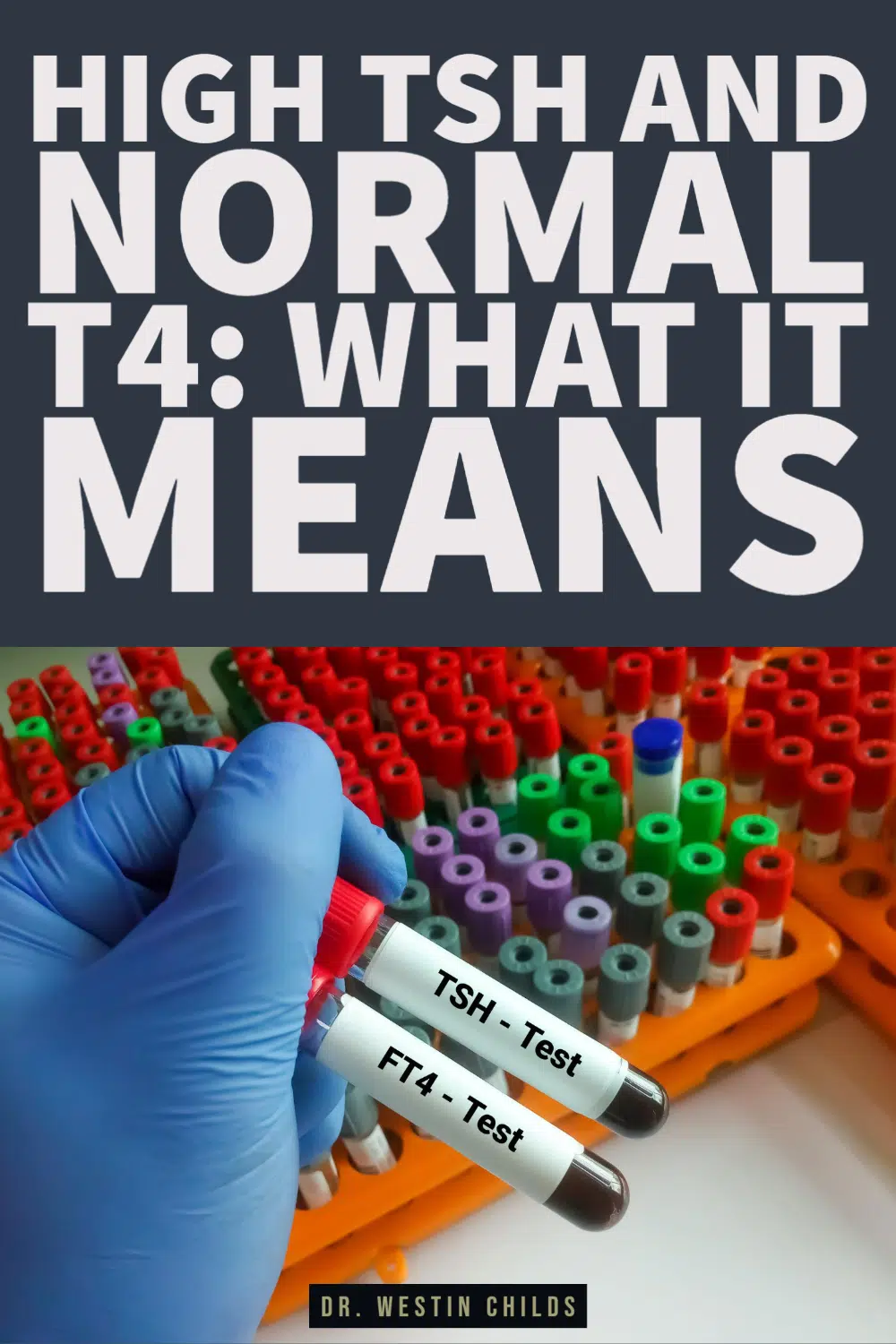
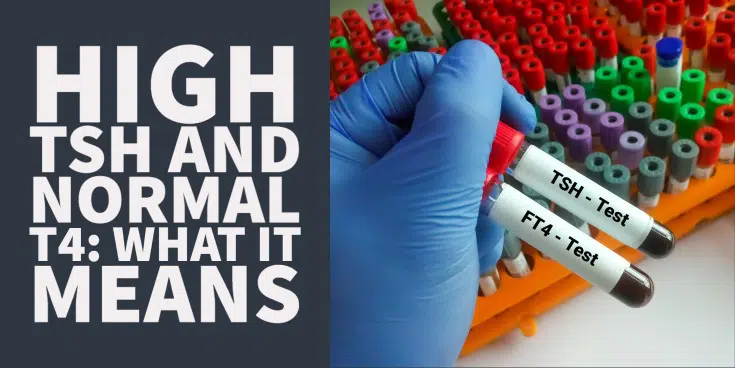
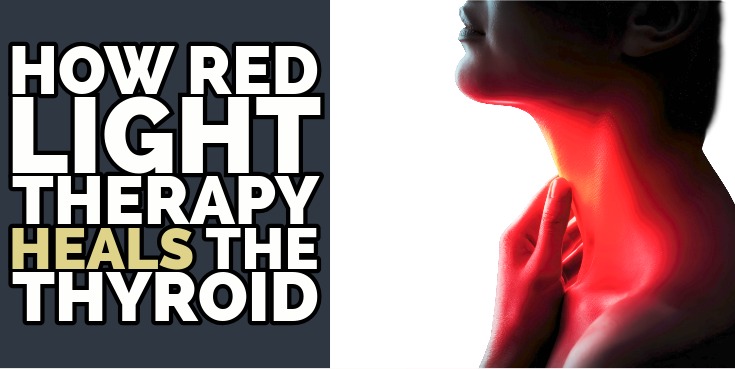
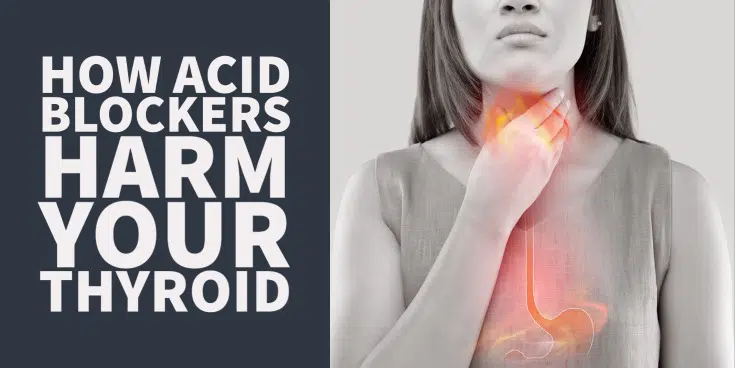

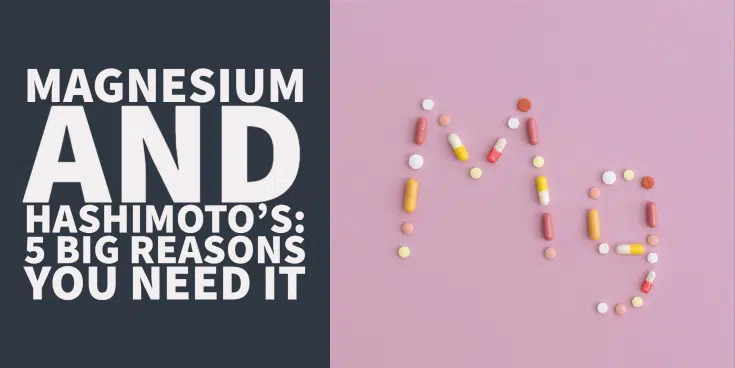



Dr. Childs,
I have been having issues with a low TSH and a Low FT4 on every lab test I have and my Endo keeps lowering my synthyroid no matter what I say she comes back with “your bones are going to crumble and you could get heart disease”,not caring that my cholesterol level have sky rocketed after thyroidectomy for cancer.
I was taking 100mcg synthyroid and 15mcg Cytomel and now Im on 88mcg synthyroid and still the same 15mcg Cytomel. I feel under medicated and still have body pains that just won’t quit, emotional issues and the dreaded weight gain.
I’m feeling this Endo is going to cause more health issues if I continue with her, I feel doomed.
Any thought on why TSH and FT4 would keep dropping?
Hi Grace,
The higher your dose of T3 the more your TSH will drop and the more your free T4 will drop as the stimulus to produce thyroid hormone decreases.
Dr.Childs
You gave me the answer earlier this year that taking more t3 will lower your TSH and T4 will drop …what about my recent issue….. My endo reduced my T3 meds to 10mcg (from 15mcg) I’m still on 100mcg Synthyroid and suddenly my TSH increased to 1.47 and my T4 is now BELOW Range.
So if more T3 lowers t4 and tsh why would less t3 meds and same Synthyroid up my tsh and but take my t4 below the labs level? Hope this makes sense.
My fT3 is consistently at the bottom of the normal range, sometimes lower. My doctor(s) say it’s okay. My endo says that it doesn’t matter because the fT3 does not really tell us how much T3 is in the cells and that the test is not reliable in any way. But I really don’t feel so fabulous. I also have Hashi.
Hi Eirene,
It is certainly true that free T3 doesn’t tell you how much thyroid hormone is in your cells, but neither does free T4 or TSH, so using that same logic why would you look at any of the tests? The best solution is to look at all of them in tandem to get a better picture. The “best” marker for looking at cellular thyroid levels would be the free T3:reverse T3 ratio.
Hi Dr. Childs,
Can you tell us what a “good” ratio of free T3 : Reverse T3 would be?
What would cause normal T4, HIGH T3, and also slightly higher TSH (3)? It’s been this way for about a year. I can’t seem to figure out why my TSH would still be on the higher side when the T3 is high (just above normal range).
Hi, I have been on levothyroxine for more than twenty years and have never been optimal. I also have Lupus and have always blamed not feeling well on Lupus. I now realize that it has been more Hashimoto’s than Lupus. I started on NDT four months ago stating with one grain alternating levo and NDT every other day for one month and I also started a gluten-free diet. The first month I felt great. It was emotional and I was encouraged as I haven’t felt well for years. After one month I declined and my dose was raised to one and a half grains. Still no improvement and no weight loss as I was dieting. Again the Doctor raised my dose to two grains which I have been on for the last six weeks. My TSH is now high, my free T3 is borderline low and my total T4 is midrange. I am having symptoms and I see my Doctor in a couple of days. I would love some direction as to what to discuss with her. Thank you
Thank you for the information.
My T S H IS at 17.48 and my free t4 is 1.1.
Not sure as of what to do first but I do have all of the symptoms as you mentioned earlier.
I am without insurance.
My current Tsh 3.333 t4 is 1.53 t3 .74. 6 months ago my doc lowered my Synthroid from 100 to 75 to 50 mg. My thyroid was removed 35 years ago, they removed most of it and radiated the rest. He said it was because I was exercising (?) however all my numbers were within the lab’s parameters. The Tsh has gone from .693 to 3.333. My symptoms are extreme tiredness, dry skin which really itches and my hair is super dry. When I asked about these issues he said they weren’t his concern. My numbers were good. I told him I wouldn’t be back. I’m 69.
Hi Barbara,
A rise in your TSH is an indicator that your dose is too low for your body which may explain your symptoms. You should also look at your labs with the optimal ranges in mind as opposed to the standard reference range. You can learn more about how to do that here: https://www.restartmed.com/normal-thyroid-levels/
Doctor, my mother is 65. Her T3 is 88 ng/dl, T4 is 5.7microgm/dl, TSH is 30.75 microIU/ml. As per the report, the T3 and T4 are in the normal range, whereas TSH is almost six times normal. What does this mean? My mother is on Thyroxine tablet(levothyroxine) 200mcg. 4-5 years back, she started with 50mcg and now has gone to 200mcg and still TSH is not normal. She has some weight gain. But she feels hot, not cold. Is this something we need to be concerned about? Anything else we can try? Thank you!
What’s “optimal,” on ranges for TSH and Free T4? My TSH has been above 4 (average 4.375) for about the last 7 years, according to LabCorp, so my PCP has ignored it. I have NO symptoms, save for a benign nodule, and an average 1.1575 FT4. Antibody tests are “normal.”
What can I do to protect my thyroid function?
Hi Cara,
I would recommend that you take a look at this article for more information about how to protect your thyroid gland and function: https://www.restartmed.com/natural-thyroid-remedies/
Sixty-two-year-old male with steadily rising TSH over a three year period. Results for each:
TSH-2.340/4.510/17.280
T4-6.1/6.2/3.8
FT3-3.1/3.3/3.0
Thyroid AB-1/2/2
The only symptom of hyperthyroidism is cold sensitivity, but I’ve always been “cold natured.”
How should I proceed?
Thank you!!
Doctor, I have high TSH 10.03 – My Free T4 is 1.0 – My Free T3 is 3.4
My Total T3 is 113 and my T3 Uptake is 32%
Please tell me what would be your course of action.
Thanks,
Patrick
Doctor, I had a total thyroidectomy in 2005. Was found to have stage 1 papillary thyroid cancer.
I have been cancer free since and my Dr has always kept my TSH level below 1 to decrease the risk of the cancer coming back.
In the last 6 months my TSH has gone up to a 5.59, T3 3.1, T4 .81. I was on Levothyroxin for years and when this started happening my Dr put me on NP Thyroid. I felt better the first couple of weeks but now am feeling tired, dry skin, trouble sleeping, headaches.
I had a neck ultrasound Jan 2020 and there was no sign of any new thyroid nodules. What would you suggest next?
My T4 has to be 1.9 and thyroxine around 10.5(top range 12) to get me to Ft3 levels of 3.8 but it leaves my Total T3 around 78 and TSH 1.4. FT4 1.6-1.7 and thyroxine of 8.8 gives me debilitating hypo symptoms and puts my FT3 at 2.6.
Do you think clinically there is more benefit to the patient to push the Levo to the limit to get to an optimal FT3 or keep the FT4 around 1.4 to 1.6 and supplement with T3? Is it normal for someone who has little thyroid tissue left to need such high amounts of Levo to avoid hypo symptoms?
I do not have a thyroid due to past thyroid cancer. Presently my TSH is high at 6.01 . My free T4 is normal at 18 and my Free t3 is normal at 2.9. I think the free t3 is on the lower end of normal.
The thing is that I am experincing heart palpitations, which, I normally only get if my TSH is low. I do feel cold and low energy and have gained a little weight, but that may be from the lyrica I am on for sciatica numbness in my leg. Can you advise anything?
Hi Dr,
I had thyroid cancer and had my thyroid removed. My TSH is 16, on 88mcg of Levothyroxine. My T4 is normal. My specialist is not willing to change my dose. I am very symptomatic. My TSH has been 14-16 for the last 6 months and she seems unconcerned. Is there something Im missing here? Thanks!
Hi Deja,
The only thing you are missing is a good provider! No one should be walking around with a TSH of 16. You need your dose adjusted as soon as possible.
I am perplexed on my next steps. My TSH Is insanely high at 12, while my T4 is low and T3 high. I’ve been on Armour Thyroid for many years, and my numbers have stayed within range even throughout pregnancy. I am not looking to change to just a synthetic T4 but I am perplexed as to what could even be going on, let alone how to remain on armour doing this!
Hi Jennifer,
Please see this article which explains why this can happen: https://www.restartmed.com/you-cant-stay-on-the-same-thyroid-medication-dose-forever/
Hi Dr. Westin
I have a TSH of roughly 6.3. I’ve taken two labs which were both a month apart. T4 came back both times in the middle of range at 1.47 (normal) and T3 is on the higher end of range on one at 4.4 and slightly above range on the other at 4.8.
Clean diet and very active! I’ve seen no weight gain, only symptom I’m noticing is fatigue at times. I’d like to look at all options before starting any medication. How should I proceed?
Hi Beau,
I would take a look at these natural therapies which can sometimes be used as alternatives to medication (though, not in all cases): https://www.restartmed.com/natural-thyroid-remedies/
In addition, you can also consider other things such as supplements as well: https://www.restartmed.com/product/hypothyroid-bundle/
In reality, some combination of both would probably be ideal.
My TSH is 85.24. My T3 and T4 are in normal range. My doctor told me not to worry about my TSH level as long as T3 and T4 are in normal limits. My hair is falling out. I’ve gained 25 pounds, I have zero energy. My skin looks like a crocodiles skin. I have trouble sleeping. Overall I feel like crap. I have had borderline fatty liver since I was about 50. And, 3 months ago I was diagnosed with type 2 diabetes. I’m 64 years old. 5’9 and now weigh 220. I used to weigh 170. I have never had diabetes issues. Until a week ago I was on 200 mcg of Levothyroxin. Now, my doctor has raised my LEVOTHYROXIN to 225 mcg. I take it on a empty stomach as prescribed. The TSH issue has been going on for about a year so I changed doctors recently. I kept telling my old doctor I felt like crap.
Hi Kimberly,
It may be a good idea to switch to a different formulation like Tirosint. If your TSH is 85 on a dose as high as yours then it indicates you are either resistant to T4 or that it isn’t making it into your body (absorption issues). There are case reports of certain inactive ingredients in various thyroid medications that can this absorption issue.
Hello – Much like Kimberly, above, I have registered a very high TSH level in my most recent blood work of 04/29/2022 (TSH level is 88.74; T4 registers 1.0). I was diagnosed with papillary thryroid cancer in August 2008 and had a thyroidectomy in September 2008. I have been on Levothryoxin since that time – although, admittedly, I sometimes forget to take it or may have taken it at the wrong time of day; that, however, is the exception rather than the rule. I received a call from my PCP and he is raising my dosage on my synthroid and will retest in approximately 6 – 8 weeks. I have a couple/few concerns:
1. At the same time I was diagnosed with papillary thyroid cancer in 2007, my mother was diagnosed with anaplastic thyroid cancer and that took her in May of 2008. I have been assured by numerous physicians over the years that anaplastic thyroid cancer cannot be hereditary, so I have tried to always push it far to the back of my head. Do you concur with those assurances;
2. My TSH has never, ever, been so out of whack. In fact, on 07/03/21, my level registered .36. Is there, or should there be, a concern for such a dramatic increase in such a short period of time (approx. 10 months);
3. While researching my high TSH level this morning, I found an article that indicated a higher dosage of Levo combined with certain weight loss medications can be extremely dangerous. I am currently taking Phentermine for weight loss. What are your thoughts on increasing the Levo while taking Phentermine; and
4. I was also recently prescribed, and have been taking (in the past 4-5 months), Trintellix for severe depression. It was determined that the prior medications I had been taking for depression/anxiety for well over 25 years were no longer effective. Are you aware of any potential negative effects of Trintellix being taken by a patient who is also taking a thyroid stimulator?
Thank you very much, in advance, for any thoughts you may have!
Hi Liz,
Not specifically with Trintellix but some antidepressants have been shown to decrease thyroid function: https://www.restartmed.com/prescription-medications-that-block-thyroid-function/
Hello Dr. Childs,
My today’s lab results are:
TSH 9.75 mcU/mL (Lab range, 0.27 – 4.20 mcU/mL)
T3 FREE 2.8 pg/mL (Lab range, 2.3 – 4.2 pg/mL)
T4 FREE 1.2 ng/dL (Lab range, 0.9 – 1.8 ng/dL)
In 2019, my TSH was greater than 90…my T4 Free was 2.3 and T3 Free was 3.7…took medicine for few months and the Dr. told me to stop the medicine after the T3 and T4 dropped very low…the TSH numbers were as follows since 2019:
>90.00 H 65.39 H 45.68 H 23.93 H 11.80 H 10.70 H 13.40 H 11.20 H 9.01 H 9.75 H (today’s)…
I take a lot of vitamins and minerals…used to exercise but not much any more since I’m a caregiver…I don’t like taking medicine…trying to avoid that…Feel cold especially at night…I use plenty of covers while my siblings don’t…my body temperature has been 96 as an average…few times, it read 95…and my resting heart rate is 45 to 50…I would share more if need to…your thoughts please…appreciate it…need to lose weight but it’s not as easy as it’s said…
Hi Mack,
Please see this article which outlines the optimal ranges for thyroid function lab tests! You can compare your results to the optimal ranges found here: https://www.restartmed.com/normal-thyroid-levels/
Once you do, you will want to get started on some natural therapies that can be found here: https://www.restartmed.com/natural-thyroid-remedies/
hi , I’m a 44 female went to the doctor with water retention on knees hair loss and weight gain ,my tsh was 7.49 and my t4 was 8.6 doctor says because the t4 is within range she is not going to treat my tsh as high , so confusing as i have all the systems i feel of a failing tsh being 7.49 seems really high and no other health issues i can contribute to water weight , hair loss and weight gain as i am an active female and healthy , current weight is 171 and 5’5 tall , so confused i feel i need to seek another doctor as this one is unwill to take my concerns serious , i can feel something is not right and everything feels out of wack . am i over thinking the situation or should i be concerned ?
Hi Izzy,
Newer research suggests that a TSH level higher than 2.0 to 2.5 is a problem so you may want to seek out a second opinion from someone more knowledgeable. You can learn more about how to find a competent thyroid doctor here: https://www.restartmed.com/how-to-find-a-doctor-to-treat-your-thyroid/
42 years old. My TSH levels in 2018 were .54, 2019 .44, 2021- 036, and in 2022 are now .27. I have had to fight to keep getting my TSH checked over the years as I know something is off in my body. T4 is in a normal range at .95, per the lab. If my DR does nothing, should I get a 2nd opinion?
Hi Amy,
If you are symptomatic then, yes, I would recommend getting a second opinion. You can use this resource to help you find a more competent thyroid doctor: https://www.restartmed.com/how-to-find-a-doctor-to-treat-your-thyroid/
And you can use this resource to help you learn more about the difference between optimal and normal ranges: https://www.restartmed.com/normal-thyroid-levels/
Hi, 44 year old female. Papillary thyroid cancer. Partial thyroidectomy which has resulted in a high TSH with reflex (8.382 mU/L) while showing normal T4 T3. Just staring this journey and proceeding in November with removal of the remaining thyroid. As of now, what are some symptoms that I may begin experiencing? And just like the article mentioned, will vitamins and exercise help alleviate some of the symptoms?
Hi Patty,
Do you mean symptoms of a high TSH? You can find the full list here: https://www.restartmed.com/high-tsh/
In regards to vitamins, supplements, exercise, and diet, yes, I can’t think of a time when it’s ever a bad idea to change those things to try and get healthier. How much they will help is another story, but they certainly won’t hurt.
Hello doctor. My name is Julianna!
I just turned 22 a couple days ago… when I was 18, I found out I had hypothyroidism. My symptoms were; extreme fatigue (I was sleeping in class all of the time and then immediately going home and sleeping till dinner time and then would go to bed right after dinner), weight gain… 20 or so pounds and I’m now weighing at 180-190 (being 4 years later and I’m 5’1 almost 5’2), my hair was falling out as well. My TSH was over 10 but wasn’t anymore than 12 and my other levels were normal. I’ve actually been trying to conceive with my fiancé for over a year now and no luck. I did stop taking Levothyroxine (125 mg) for about a year or more and I JUST started taking it again (bad idea but life happened and I unfortunately stopped focusing on my health and started experiencing the same symptoms again after stopping my medication which was on the right track!) I am on the same dosage as before after I got my blood work tested and my TSH was at 8.52 and T4 Free was normal range. I’ve been exercising two-three times a week by just walking around my neighborhood for an hour at a steady pace without taking breaks. But I am super tired still and don’t really know what I can do to boost my energy up. I also eat fairly healthy and drink water, I don’t really stress anymore either.
My question is, should I get a full thyroid panel done again like I did when I was 18 or should I just focus on my TSH with taking Levothyroxine and hoping that’s my only problem? I also read that many women with hypothyroidism have PCOS (from hypothyroidism Facebook group) so that’s also my concern on what I could potentially have but it just seems that my TSH is super high and my other levels are normal from what I feel. It’s just so confusing to me at times.
I do have a question about vitamins… how long should I wait after taking Levo to take vitamins/pre-natal. I take Thorne Pre Natal as multiple women suggested this pre natal with having hypothyroidism, and I also take Vitamin D as my vitamin D was very very low… don’t know if it’s because of my thyroid issues.
Thank you for your time.
Hi Julianna,
If you are having low thyroid symptoms again then it’s a good idea to recheck all of your thyroid lab tests (not just the TSH).
Does tamoxifen effect lab readings for TSH?
Hi Lina,
Yes, some tests can change when using tamoxifen due to its impact on thyroid-binding globulin: https://pubmed.ncbi.nlm.nih.gov/7707111/
Greetings Dr. Child’s,
I’m a 37 y/o female who is very active. I’m 5’8” and 130lbs. I take vitamins and birth control pills (Microgestin FE 1.5-30). I’ve been on birth control to regulate my period and help me with acne for almost a year. I haven’t had my period in 7 months and am not pregnant. My dermatologist put me on Spironolactone and Nioxin because of thinning hair. I would love some insight into my labs.
TSH with Relfex to T4 5.67. Prior years were 3.61 (2019)/2.33 (2020) /2.49 (2021)
My T4 Free is 1.2.
I read your article about elevated TSH and normal T4 but didn’t see anything about birth control and acne medicine.
Can you help?
Hi Emma,
I am not seeing new patients so I can’t help in that way but I would recommend checking out this article for more information regarding your thyroid lab tests: https://www.restartmed.com/normal-thyroid-levels/
Hi, my son has been taking Levothyroxine for years but his TSH is now 7.88 and his T4 is 1.26. Is this normal?
Hi M,
I wouldn’t say it’s normal but it’s not uncommon. There are many things that can cause a TSH to abruptly rise including lab error. You can learn more here: https://www.restartmed.com/you-cant-stay-on-the-same-thyroid-medication-dose-forever/
Hi
I have high TSH 6.9 but normal t4 and t3. normal antibody levels etc. Where do I go from here? Do I need any more checks? could I have issues with my pituitary glands? I have symptoms of feeling cold and mild constipation. normal levels of vit d, magnesium, and b12. random cortisol is normal
I have asked a nutritionist to work with me. Anything else that needs checking now? I feel lucky to have found this so early. Any advice would be very much appreciated
Hi Mel,
It would be a great idea to start with some of the natural therapies listed here: https://www.restartmed.com/natural-thyroid-remedies/
Dr. Childs,
Hello. I am 38yo with no children and pregnant. At 28yo (2013) I was diagnosed with Papillary Thyroid CA (stage II) and underwent a Total Thyroidectomy followed by Radioactive Iodine chemo TX which removed all cancer. Yearly TSH & T4 levels/labs guided Levothyroxine/Synthroid RX management ever since. Only minor tweaks to dosage needed here and there to keep levels in normal range. Sadly, over the last 10 years and since cancer diagnosis and TX, my husband and I have experienced “unexplained” infertility with only one pregnancy ever achieved prior to now, which resulted in miscarriage in 2020.
I am over the moon to be pregnant again, currently 9 weeks along. However, my excitement has been stifled as my annual TSH/T4 levels came back last week at 33.1(TSH)/1.05(T4). Subsequent recheck came back with TSH even higher at 52(TSH), 1.0(T4). Previous results from last year (Feb. 2022) were normal: 3.9(TSH)/1.7(T4). Pregnancy symptoms basically mirror hypo symptoms, so it’s been doubly difficult for me to understand what is normal for me to feeling or not.
Do you have any experience with treating or evaluating pregnant women who have sudden elevated TSH but also no actual thyroid organ/are on thyroid hormone replacement therapy meds? As I await a new referral and appointment with a reproductive endocrinologist for follow up, I am worried about my pregnancy and what these levels mean with regard to my unborn child. Do you have any insight? Is my pregnancy itself causing the spike in TSH level? Or, is it randomly simultaneous? What does (or could) it mean is going on? Is there anything I can or should do to intervene if this might be a threat to, or indication that something is going awry with, my pregnancy? Should I be seeking emergent medical care instead of waiting another whole week to see a new specialist?
Current Levothyroxine dose is 100mcg QD and I have a normal BMI with ~5 lbs of weight gain since pregnancy.
Ultrasound last week showed baby was doing well, heartbeat was strong, rate in 160’s. They did also find a pretty large, slightly abnormal cyst on my right ovary – I only mention this in case it might have something, anything, to do with what is going on in regard the bigger picture.
I am thankful for your time and any level of professional feedback you could provide. I’m feeling like a ticking time-bomb (am I one?), lost and helpless.
Allison & Baby
Hi Allison,
I would recommend checking out these articles which explain your situation in more detail:
https://www.restartmed.com/tsh-levels-during-pregnancy/
https://www.restartmed.com/thyroid-and-pregnancy/
Hi. My TSH is 4.53 and T4 .76 and T3 4.5. I am allergic to Thyroid medicines but can take Armour. Should I be concern and what steps can I take?
Hi Frances,
If you can only take armour thyroid then that’s the best option for you! In regards to other treatments, there are still plenty of other therapies you can add on top of your thyroid medication: https://www.restartmed.com/natural-thyroid-remedies/
I was on Levothyroxine for almost 20 yrs. Started natural dissected hormone for a few years, then Euthyroid, back to Levo….started experiencing joint pain in hands and legs. Also a tremor in my jaw. I’m on no other meds. Became vegan year and half ago. Gluten free. Regular practice of meditation. I’m 5’6″ and weigh 125lbs. I’m 58. Athletic all my life, never been overweight.
I quit ALL thyroid meds about 9 mos ago and immediately joint pain and tremors stopped. I feel great. Started taking natural thyroid supplement w/iodine, b12, maganese, zinc, selenium to name a few.
My labs on 7-28-22: tsh5.69 free t4 1.36 free t3 97ng/dL
On 5-26-23,labs were: t4 11.9, t4 1.19, t3 2.6
The only symptom is some mild constipation (very mild) but have dealt with digestive issues most of adulthood. They really cleared up once vegan diet implemented, until lately.
I do not want to go back on thyroid medication as the side effects were bad for me.
Question is: DO I NEED TO BE ON MEDS FOR THYROID AT ALL?
AND if so…what is the most natural (vegan) one? I don’t want synthetic chemicals in my body. Is there any help at all?
Also, list of foods to avoid are beans and legumes, soy (tofu)…my primary protein source as a vegan! There’s not much left nutritionally is I don’t eat animals. ???
Thank you for ANY help.
Routine test last March came back as.
TSH 0.24
Free T4. 22.2on
Tyrosine code reduced
Beginning of May ended up in hospital with racing heart, sweating and dizziness
Bloods taken again and doc said TSH was now in range but T4 was now 26 suggesting hyperactive and reduced dose again
6 weeks later bloods taken again
TSH 7.1
FT4 17th
FT3 3.6
I’ve been treated for underactive for around 20 years now and never had any issues with keeping levels steady apart from the odd tweak to dose every now and then, last time was 6 years agot
Can you give me any insight to what is happening please?
For the last 3 or 4 months I’ve also had what can be described as an ache low down in my throat, not a sore throat like infection, a dry cough and more trouble swallowing
Hello Dr. Childs
TSH Level: 13.0
T4 Level: 0.7 (In normal range)
Thankyou!
Hi I had a bout of hyperthyroidism due to a virus and was on 10mg Methimazole for about 2 months after repeating the labs my TSH is now 13.1 and my T4 is .86. I have weaned off the methimazole to m5g. Does this mean I have Hypothyroidism now or just temporary till I get off methimazole ?
Hi Lori,
It’s hard to know for sure without specific dates and doses of the methimazole. It’s possible your methimazole was just dosed too high and your TSH will return to normal in a few months, but it is also possible you now have hypothyroidism (though less likely).
Hello I have three high TSH results in past 5 weeks. 23, 36 and now 21. FT4 is normal. I do have Hashimoto and I’m 59 yo. Currently take Tirosint 150mcg 5 days a week. And I’m asymptomatic. I did have a sudden major life change during the course of testing and needed to quickly change jobs after the start of the school year. Is it possible the stress of being reassigned and then choosing to leave my district triggered the high TSH? Could I watch it for a while and see if it comes back down?
Greetings!
This article was exactly what I was looking for, thank you. I had your recommended 7 thyroid tests done 12/21/23. TSH=10.08 (Previous TSH test in Dec. 2022 while taking Synthroid was 2.52); T3=3.4; T4=0.9. All others in ‘Normal’ to ‘Optimal’ range. I stopped taking Synthroid 112Mcg 10/20/23 as an experiment (I’ve previously taken this medication daily for at least 5 years). I appear asymptomatic of the typical symptoms associated with a high TSH. I just requested a retest.
I’m exercising & incorporating some of your recommended supplements into my daily routine. I’m wrestling with taking my medication again . Family practice doctor tells me I’ll always need Synthroid and is against me not taking. What are some long-term effects of taking Synthroid we should be concerned about? Confused & conflicted about my next move…………………
Hi Kai,
There are plenty but perhaps the most concerning many be an increase in cancer risk: https://www.restartmed.com/does-levothyroxine-cause-cancer/
It’s not as cut and dry as you might think, though, so I would recommend reading the article for more information.
Hi Dr Child’s. question my doctor did a Thyroid test for TSH / reflex T4 results were 1.92 and a Free T3 was 2.40. So I had talked to him by switching to a NP Thyroid medication. as I am currently on Levothyroxine. 100mcg. wondering which dosage would be the best for those results. with out getting way too much NP or not enough?
which I have been having many issues of always exhausted , tired, gaining weight just dont’ feel good. which is making exercise more and more difficult. i have gained about 60 lbs. of weight over the past 5 years. just cant seem to loose it Even though my diet is very healthy.
Thanks.
My TSH is consistently high, around 10, but my free T4 and free T3 are normal. My doctor has tried me on Synthroid and Armour thyroid, and both of those caused increased anxiety, increased insomnia, heart palpitations and panic attacks. I’m sure my adrenal glands are involved since I lost my husband recently after months of him suffering. I would really love to get some energy back, but I’m scared to try thyroid replacement again after what it did to me. Where do I go from here? I already take things to support my adrenals.
Hi Janet,
You can try other forms such as tirosint and tirosint-sol. Alternatively, you can also look into thyroid glandulars as well as T2 thyroid hormone:
https://www.restartmed.com/product/t2-cream/
https://www.restartmed.com/product/thyroid-glandular-plus/
What about high TSH and T3 but low T4? This is what my 5 year old’s results recently came back as, and have been for quite some time. We just keep getting told ‘we’ll keep an eye on it’, meanwhile she is a 39kg 5 year old.
Hi Belinda,
Thyroid function in kids works very differently from adults. Their bodies often run higher TSH levels and shift T3 and T4 around as part of normal growth and development, so the same adult reference ranges should not be used. In many cases their thyroid can self regulate without intervention as long as symptoms are monitored closely.
That said, the weight you are referencing here may be an issue and should be evaluated further. Depending on the severity of her labs, she may need treatment.